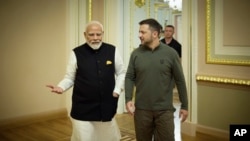Days after visiting Ukraine, Indian Prime Minister Narendra Modi told Russian President Vladimir Putin that he supports a quick end to the Russia-Ukraine conflict.
Modi’s discussion with the Russian leader on Tuesday came a day after he had a phone conversation about the war with U.S. President Joe Biden.
In a post on X, Modi wrote that he had “exchanged perspectives on the Russia-Ukraine conflict and my insights from the recent visit to Ukraine” with Putin. He said that he reiterated “India's firm commitment to support an early, abiding and peaceful resolution of the conflict."
During his meeting with President Volodymyr Zelenskyy last week, the Indian prime minister had urged talks between Russia and Ukraine and said that “we should move in that direction without losing any time.” He had offered to play an active role in efforts to achieve peace.
Modi’s visit to Kyiv came amid criticism from Western allies that New Delhi has not condemned Russia’s invasion.
The Indian foreign ministry said that during his phone talk with Putin, Modi underlined the importance of dialogue and diplomacy as well as “sincere and practical engagement between all stakeholders.”
Modi and Putin also reviewed progress on bilateral ties and discussed measures to further strengthen their partnership, the statement said.
In his talk on Monday with Biden, Modi had also expressed India's support for an early return of peace and stability.
“I think Modi’s conversations with the Russian and American leaders come amid an effort by India to convey that it is serious about using its leverage to resolve this conflict and to stake a claim for itself as an autonomous actor,” according to Harsh Pant, vice president for studies at the Observer Research Foundation in New Delhi. “It has been faulted for not doing that in the past, so it is reaching out to the countries most closely involved in the conflict.”
India has not proposed any peace plan to resolve the war. But with New Delhi being one of the few countries that enjoys good relations with both Russia and the West, it hopes to push talks between Moscow and Ukraine.
Following Modi’s visit, Zelenskyy told reporters that he had told Modi that he would support India hosting the second summit on peace as Kyiv hopes to find a host among the countries in the Global South. The first peace summit was held in Switzerland in June.
In Kyiv, India’s foreign minister, Subrahmanyan Jaishankar, had said that India is willing to do whatever it can to help end the war “because we do think that the continuation of this conflict is terrible, obviously for Ukraine itself but for the world as well.”
The resolution of the conflict is important for India, as Russia’s continued isolation could push Moscow into a tighter embrace with New Delhi’s arch rival, China, say analysts.
“India does not want Russia and the West’s rupture to be permanent because that only means that the Moscow-Beijing dynamic becomes much more solid,” according to Pant. “India also wants a stable Europe which can then play a larger role in ensuring a stable Indo-Pacific. That is very important for India. A Europe which is involved with its own internal challenges rather than a global role is something India does not want.”
Modi visited Ukraine six weeks after his visit to Moscow elicited strong criticism from Zelenskyy and Western allies. The first-ever visit by an Indian prime minister to the country was billed as a “landmark” one.
However analysts in New Delhi point out that Modi’s trip to Ukraine will have no bearing on India’s warm relationship with the Kremlin. Before he visited Kyiv, India’s foreign ministry had said that India has “substantive and independent ties with both Russia and Ukraine, and these partnerships stand on their own."




